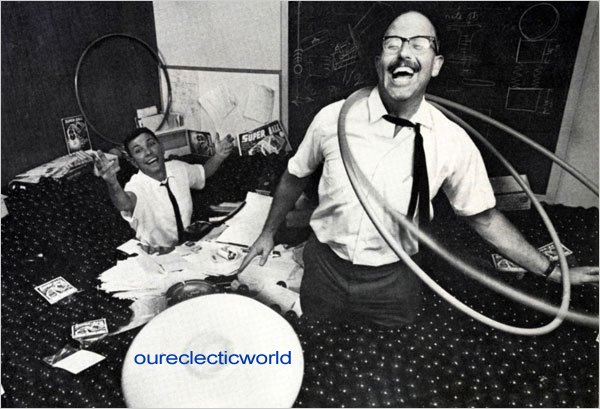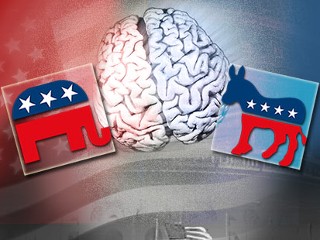---
Sept. 22, 2008 | "Let's make sure that there is certainty during uncertain times" -- George W. Bush, 2008
Last week, I jokingly asked a health club acquaintance whether he would change his mind about his choice for president if presented with sufficient facts that contradicted his present beliefs. He responded with utter confidence. "Absolutely not," he said. "No new facts will change my mind because I know that these facts are correct."
I was floored. In his brief rebuttal, he blindly demonstrated overconfidence in his own ideas and the inability to consider how new facts might alter a presently cherished opinion. Worse, he seemed unaware of how irrational his response might appear to others. It's clear, I thought, that carefully constructed arguments and presentation of irrefutable evidence will not change this man's mind.
Perhaps the single academic study most germane to the present election is the 1999 psychology paper by David Dunning and Justin Kruger, "Unskilled and Unaware of It: How Difficulties in Recognizing One's Own Incompetence Lead to Inflated Self-Assessments." The two Cornell psychologists began with the following assumptions.
To put their theories to the test, the psychologists asked a group of Cornell undergraduates to undergo a series of self-assessments, including tests of logical reasoning taken from a Law School Admissions Test preparation guide. Prior to being shown their test scores, the subjects were asked to estimate how they thought they would fare in comparison with the others taking the tests.Incompetent individuals tend to overestimate their own level of skill. Incompetent individuals fail to recognize genuine skill in others. Incompetent individuals fail to recognize the extremity of their inadequacy.
On average, participants placed themselves in the 66th percentile, revealing that most of us tend to overestimate our skills somewhat. But those in the bottom 25 percent consistently overestimated their ability to the greatest extent. For example, in the logical reasoning section, individuals who scored in the 12th percentile believed that their general reasoning abilities fell at the 68th percentile, and that their overall scores would be in the 62nd percentile. The authors point out that the problem was not primarily underestimating how others had done; those in the bottom quartile overestimated the number of their correct answers by nearly 50 percent. Similarly, after seeing the answers of the best performers -- those in the top quartile -- those in the bottom quartile continued to believe that they had performed well.
The article's conclusion should be posted as a caveat under every political speech of those seeking office. And it should serve as the epitaph for the Bush administration: "People who lack the knowledge or wisdom to perform well are often unaware of this fact. That is, the same incompetence that leads them to make wrong choices also deprives them of the savvy necessary to recognize competence, be it their own or anyone else's."
[click here to read full text]



8 comments:
I feel a little incompetent.
but I vote for you
Brilliant article. Even though I am CONFIDENT psychology is bogus :-) I still enjoy reading about a good study now and then.
Psychology is bogus as a whole? Are you kidding me? :)
The studies are interesting and persuasive, but it doesn't hold the same ground as other sciences. It has one of the darkest pasts I know of (the unethical studies, pre-frontal cortex lobotomies (they did those for years making people "soul-less" and sometimes vegetables), etc). I guess my beef with psychology is that there really isn't a ton of concreteness to it. In other words I take these type of studies as good reads, interesting and entertaining, but nothing life-changing or long-lasting. I don't mean this to be offensive, I DO enjoy psychology, it's fun.
Let me amend this thought:-). I respect psychology (although not to the same extent as other non-social sciences). I just get uneasy when people invest too much belief into it. Things like I.Q. tests, Skinner boxes, lobotomies, these things have been used (and possibly erroneously) as mainstream tools (example skinner boxes and Pavlov ideas in education). With all the unknowns and ambiguities in the human brain, I don't like coming to any conclusions with the information and insight we have or have had in the past. I do find activity of certain areas of the brain during certain thought processes interesting, but not enough to come to the conclusion that people don't change their minds or that emotions are the primary player in political/religious decisions. That could be true, but based on the studies referenced I would say it still a hypothesis and far from a conclusion as is much of psychology. Does this make any sense, or am I just projecting the same bias that most physicians have towards psychiatrists? I hope it's not just that.
Psychology isn't bogus, it's just that law school stuff is way out of it's league. A psychologist trying to analyze the LSAT is like a 5th grader doing quantum physics.
You guys have such professional pride :) You'll make a corporation happy someday :)
Post a Comment